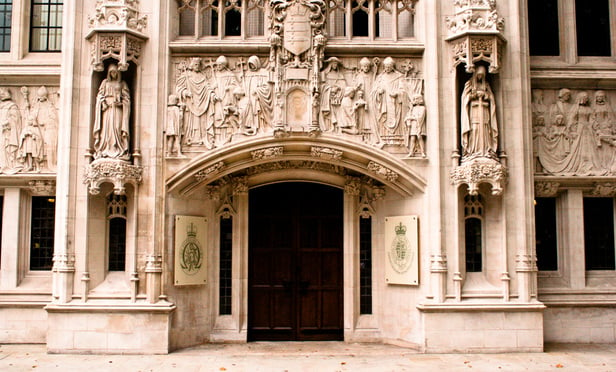Lawyers React to Supreme Court Government Prorogation Ruling
The judgment is a 'remarkable assertion of judicial authority' and 'evidence of the robustness of our system', but it has left some feeling depressed.
September 24, 2019 at 07:02 AM
5 minute read
A range of the U.K.'s top lawyers have spoken out following the Supreme Court's historic ruling that the Prime Minister's decision to prorogue parliament for five weeks was unlawful.
Mishcon de Reya and Blackstone Chambers won out in the case, representing businesswoman Gina Miller. Mishcon dispute resolution partners Rob Murray and James Libson instructed Blackstone Chambers' Lord Pannick QC and Tom Hickman QC.
Pannick argued that Boris Johnson's decision to prorogue parliament was an "unlawful abuse of power".
Sir John Major, supported by Herbert Smith Freehills partner Andrew Lidbetter, also intervened in the case. Blackstone's James Eadie QC and Landmark Chambers' David Blundell were acting for the government.
Dan Tech, head of public law at CMS, called the ruling a "remarkable assertion of judicial authority", adding: "The readiness of the court to overturn such a highly political prerogative power is what makes this decision legally so notable."
Lidbetter of HSF said: "This is plainly a case of fundamental constitutional importance in relation to the relationship between parliament, the executive and the courts.
"We are pleased that the Supreme Court has found that the decision to advise Her Majesty to prorogue parliament was unlawful, because it had the effect of frustrating or preventing the ability of parliament to carry out its constitutional functions without reasonable justification.
"When reaching its conclusions, the court specifically referred to the unchallenged evidence of Sir John regarding the usual time it takes to draft a Queen's Speech."
Prime Minister Boris Johnson is now expected to face requests to bring members of parliament (MPs) back into their role in parliament.
Ros Kellaway, partner and head of the competition, EU and trade group at Eversheds Sutherland, reacted in a statement: "This is an extraordinarily strong, and most importantly unanimous, judgment from the full Supreme Court. There is no wiggle room for the government here. Furthermore, the court has dealt immediately with the effect of its judgment on the unlawful prorogation, [so] parliament can start sitting immediately."
Jim Cormack QC, litigation partner at Pinsent Masons, added that by focusing on the effects of prorogation, "the Supreme Court has restricted the Prime Minister making it very difficult for him to attempt to prorogue again in the run-up to the Brexit deadline".
He went on: "In the eyes of the courts, he could very well be seen to be acting unlawfully on a second occasion by interfering with parliamentary scrutiny without a clear justification during an unprecedented and critical period for the future of the UK."
But whether the government tries to prorogue again and whether MPs agree to a recess for party conferences will depend on how much time is left for parliament to scrutinise the government's policy on Brexit, according to Andrew Hood, regulatory partner at Fieldfisher.
In any case, Charles Brasted, public law partner at Hogan Lovells, pointed out that if Mr Johnson sought to prorogue parliament again in the near future, "he would have to give cogent and lawful reasons for doing so, and it is highly unlikely that it could be of anything like the length previously intended", adding: "The law has now returned this matter firmly into the court of politics."
Mishcon de Reya's Libson was upbeat, saying: "We are glad that the court recognised the threat to the rule of law caused by a prorogation based on misleading advice given to the Queen.
"This second success for our client Gina Miller in the Supreme Court is a testament to her resolve to take whatever steps are required to ensure executive overreach does not become a feature of our democracy.
"This case shows that our courts can be relied on to hold the executive to account when necessary and is evidence of the robustness of our system of separations of powers."
But not everyone was happy about the ruling. One Magic Circle firm corporate partner said: "My first reaction was depression. It feels to me that we're going down the same route as the U.S., with the courts getting involved in politics. No matter your views on the topic, it is a worrying trend.
"I'm sure there will be a massive crowd calling for him to resign and it puts the government in an extremely difficult position. Does he now command confidence of her Majesty if the courts ruled this way?
"I've had more discussions in the last few weeks about Brexit than in the last three years. It's absolutely front and centre now. Previously there were too many moving parts to predict. There are questions still over what this means for dealflow, and which regulators are going to be able to approve things."
Other partners pointed out the probable effect on the Brexit timeline, with Sally Shorthose, an IP partner at Bird & Bird, asking: "Where does that leave Brexit? With parliament taking a consistently anti-no-deal Brexit stance, an October 31 exit no seems less likely unless the government can pull a rabbit out of a hat in the form of an agreement with the EU that will be acceptable to a majority of parliament."
NOT FOR REPRINT
© 2025 ALM Global, LLC, All Rights Reserved. Request academic re-use from www.copyright.com. All other uses, submit a request to [email protected]. For more information visit Asset & Logo Licensing.
You Might Like
View All
Singapore Litigators Shift Competitive Landscape as Another Senior Duo Sets Up Own Shop

Squire Patton Boggs Hires 7-Lawyer Team to Beef Up ESG Practice in Brussels
2 minute read

Skadden, White & Case Guide Citigroup Demerger in Mexico
Trending Stories
- 1No Two Wildfires Alike: Lawyers Take Different Legal Strategies in California
- 2Poop-Themed Dog Toy OK as Parody, but Still Tarnished Jack Daniel’s Brand, Court Says
- 3Meet the New President of NY's Association of Trial Court Jurists
- 4Lawyers' Phones Are Ringing: What Should Employers Do If ICE Raids Their Business?
- 5Freshfields Hires Ex-SEC Corporate Finance Director in Silicon Valley
Who Got The Work
J. Brugh Lower of Gibbons has entered an appearance for industrial equipment supplier Devco Corporation in a pending trademark infringement lawsuit. The suit, accusing the defendant of selling knock-off Graco products, was filed Dec. 18 in New Jersey District Court by Rivkin Radler on behalf of Graco Inc. and Graco Minnesota. The case, assigned to U.S. District Judge Zahid N. Quraishi, is 3:24-cv-11294, Graco Inc. et al v. Devco Corporation.
Who Got The Work
Rebecca Maller-Stein and Kent A. Yalowitz of Arnold & Porter Kaye Scholer have entered their appearances for Hanaco Venture Capital and its executives, Lior Prosor and David Frankel, in a pending securities lawsuit. The action, filed on Dec. 24 in New York Southern District Court by Zell, Aron & Co. on behalf of Goldeneye Advisors, accuses the defendants of negligently and fraudulently managing the plaintiff's $1 million investment. The case, assigned to U.S. District Judge Vernon S. Broderick, is 1:24-cv-09918, Goldeneye Advisors, LLC v. Hanaco Venture Capital, Ltd. et al.
Who Got The Work
Attorneys from A&O Shearman has stepped in as defense counsel for Toronto-Dominion Bank and other defendants in a pending securities class action. The suit, filed Dec. 11 in New York Southern District Court by Bleichmar Fonti & Auld, accuses the defendants of concealing the bank's 'pervasive' deficiencies in regards to its compliance with the Bank Secrecy Act and the quality of its anti-money laundering controls. The case, assigned to U.S. District Judge Arun Subramanian, is 1:24-cv-09445, Gonzalez v. The Toronto-Dominion Bank et al.
Who Got The Work
Crown Castle International, a Pennsylvania company providing shared communications infrastructure, has turned to Luke D. Wolf of Gordon Rees Scully Mansukhani to fend off a pending breach-of-contract lawsuit. The court action, filed Nov. 25 in Michigan Eastern District Court by Hooper Hathaway PC on behalf of The Town Residences LLC, accuses Crown Castle of failing to transfer approximately $30,000 in utility payments from T-Mobile in breach of a roof-top lease and assignment agreement. The case, assigned to U.S. District Judge Susan K. Declercq, is 2:24-cv-13131, The Town Residences LLC v. T-Mobile US, Inc. et al.
Who Got The Work
Wilfred P. Coronato and Daniel M. Schwartz of McCarter & English have stepped in as defense counsel to Electrolux Home Products Inc. in a pending product liability lawsuit. The court action, filed Nov. 26 in New York Eastern District Court by Poulos Lopiccolo PC and Nagel Rice LLP on behalf of David Stern, alleges that the defendant's refrigerators’ drawers and shelving repeatedly break and fall apart within months after purchase. The case, assigned to U.S. District Judge Joan M. Azrack, is 2:24-cv-08204, Stern v. Electrolux Home Products, Inc.
Featured Firms
Law Offices of Gary Martin Hays & Associates, P.C.
(470) 294-1674
Law Offices of Mark E. Salomone
(857) 444-6468
Smith & Hassler
(713) 739-1250









